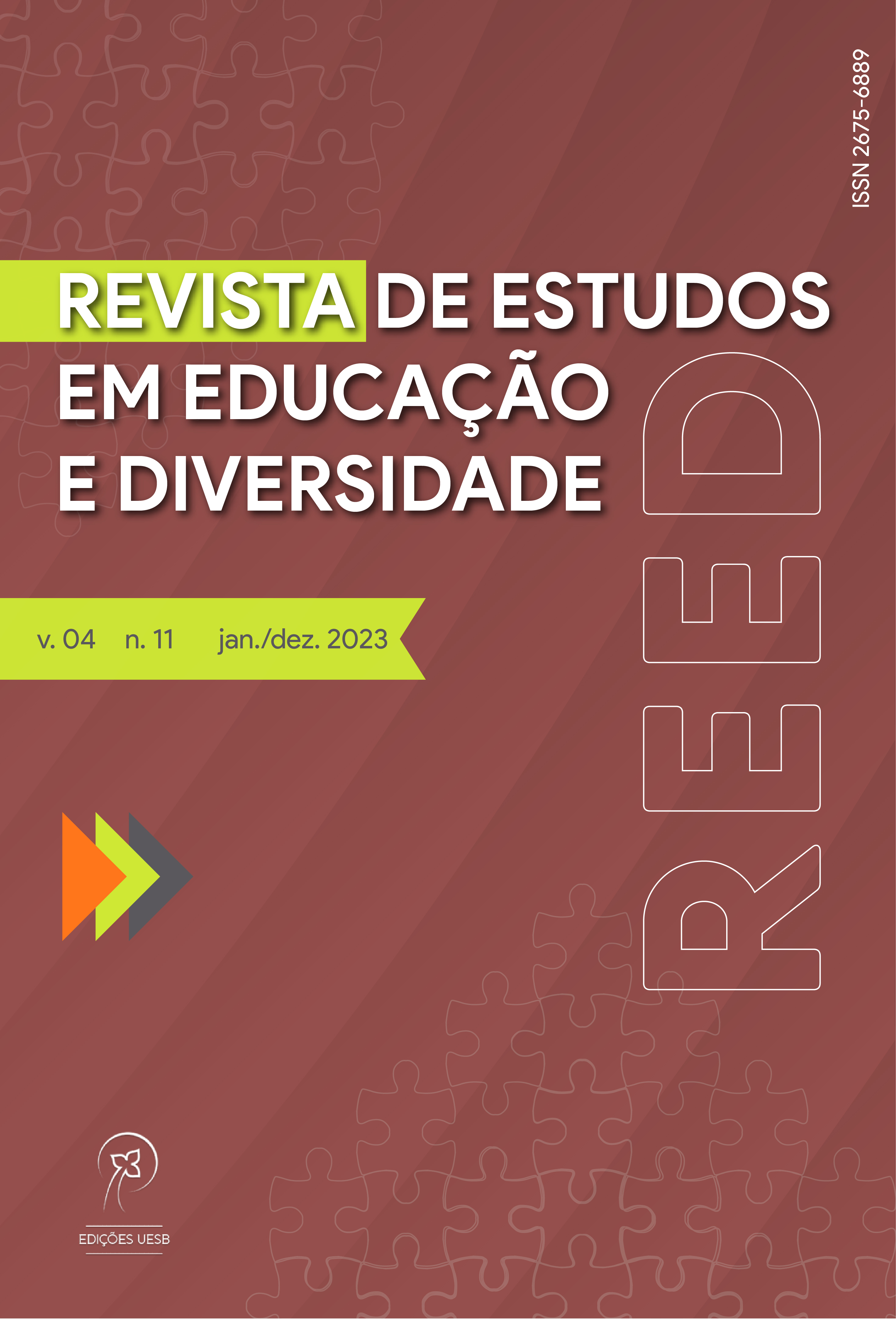The experience of applying the case study from the perspective of pibidians
DOI:
https://doi.org/10.22481/reed.v4i11.14032Keywords:
case study, initial teacher training, experiential knowledge, PIBIDAbstract
The Institutional Teaching Initiation Scholarship Program (PIBID) offers scholarships for teaching initiation and promotes communication between universities and schools, working to develop educational activities that assist in teaching and student learning. The program anticipates contact between future teachers and the classroom, so that they can experience this experience even before completing the course. The aim of this article is to understand how the experience experienced by PIBID scholarship holders – Chemistry subproject – at the State University of Santa Cruz during the application of Case Studies, contributed to the professional training of these scholarship holders. The case study was carried out in a state school in the city of Itabuna/Bahia, with third-year high school students aged between 15 and 17 years old. The school lacks adequate infrastructure, such as laboratories for practical chemistry classes, in addition to the lack of materials that could contribute to solving cases. Therefore, it is necessary to seek new methodologies, innovate and transform pedagogical practices in education, not only in the area of chemistry, but also in other areas of teaching. In view of this, research was carried out through a qualitative investigation, which was developed by executing a questionnaire applied to seven students and analyzed using a Discursive Textual Analysis. Given this, we created four categories, namely: First contact with the Case Study; Difficulties in application; Conducting Cases; and Positive and negative points in the use of cases. From these categories, it was possible to analyze the type of knowledge acquired in this experience, as well as the main challenges faced by Pibidians during the development of the Case Study.
Downloads
References
BARBOSA, A, R.; JESUS, J. A. A Utilização de Materiais Alternativos em Experimentos Práticos de Química e Sua Relação com o Cotidiano. In: CONGRESSO - ASSOCIAÇÃO NORTE-NORDESTE DE QUÍMICA, 3., 2009, São Luiz, MA. Anais [...]. São Luiz, MA, 2009.
BRAIBANTE, M. E. F.; WOLMANN, E. M.A. Influência do PIBID na Formação dos Acadêmicos de Química Licenciatura da UFSM. Química Nova na Escola, v. 34, n. 4, 2012.
CHAER, P. G.; DINIZ, P. R. R. P.; RIBEIRO, P. D. E. A. A técnica do questionário na pesquisa educacional. Evidência, Araxá, v. 7, n. 7, p. 251-266, 2011.
COCHRAN-SMITH, M.; LYTLE, S. L. Relationships of Knowledge and practice: teacher learning in communities. Review of Reserch in Education, 2009.
CUNHA, A. M. O; KRASILCHILK, M. A formação continuada de professores de ciências: percepções a partir de uma experiência. In: REUNIÃO ANUAL ANPEd, 29., 2000, Caxambu. Anais […]. Caxambu, 2000.
GOODE, W., & HATT, P. Métodos em pesquisa social. São Paulo, SP: Nacional, 1973.
GUIMARÃES, S. É. R. A organização da escola e da sala de aula como determinante da motivação intrínseca e da meta de aprender. In: BORUCHOVITCH, E.; BZUNECK, J. A. (Orgs.). A motivação do aluno: Contribuições da psicologia contemporânea. Petrópolis, RJ: Vozes, 2001. p. 78- 95.
HENNIG, G. J. Metodologia do Ensino de Ciências. Porto Alegre: Mercado Aberto, 1994.
KACHAR, V. Formação Inicial do Professor: A Mudança do “Olhar” Com Relação às Tecnologias da Informação e Comunicação. Revista E-Curriculum, São Paulo, v. 4, n. 1, dez. 2008.
MASSENA, E. P.; SIQUEIRA, M. P. Contribuições do PIBID à formação inicial de professores de ciências na perspectiva dos licenciandos. Revista Brasileira de Pesquisa em Educação em Ciências, v. 16, n. 1, 2016, p. 17-34.
MERRIAM, S. B. Qualitative research and case study applications in education. São Francisco, CA: Jossey-Bass, 1998.
MORAES, R.; GALIAZZI, M. C. Análise Textual Discursiva. 3. ed. Ijuí: Ed. Unijuí, 2016.
NUNES, J. B. C. Aprendendo a ensinar: um estudo desde a perspectiva da socialização docente. ANPED, Caxambu, 2002
PACHECO, D. A Experimentação no Ensino de Ciências. In: ENSINO E CIÊNCIA, 2, São Paulo, 1997.
PIMENTA, Selma Garrido. O estágio na formação de professores: unidade, teoria e prática? 3. ed. São Paulo: Cortez, 1997.
ROSSI, A. V. O PIBID e a Licenciatura em Química num Contexto Institucional de Pesquisa Química. Destacada: Cenário, 2013.
SÁ, L. P.; QUEIROZ, S. L. Estudo de casos no Ensino de Química. Campinas: Editora Átomo, 2009.
SILVA, L. H. de A.; ZANON, L. B. Ensino de Ciências: fundamentos e abordagens. 1. ed. São Paulo: UNIMEP. 2000.
STAKE, R. E. Estudos de caso em pesquisa e avaliação educacional. Educação e seleção, n. 7, p. 5-14, 2013.
TARDIF, Maurice. Saberes docentes e formação profissional. Petrópolis: Vozes, 2002.
TERRA, R. Teoria da Aprendizagem Significativa (Ausubel). Disponível em: https://www.makerzine.com.br/educacao/teoria-da-aprendizagem-significativa-ausubel.
Downloads
Published
How to Cite
Issue
Section
License
Copyright (c) 2023 Revista de Estudos em Educação e Diversidade - REED

This work is licensed under a Creative Commons Attribution 4.0 International License.
You are free to:
Share - copy and redistribute the material in any medium or format; Adapt - remix, transform, and build from the material for any purpose, even commercially. This license is acceptable for Free Cultural Works. The licensor cannot revoke these freedoms as long as you follow the terms of the license.
Under the following terms:
Attribution - You must appropriately give credit, provide a link to the license, and indicate if any changes have been made. You may do so in any reasonable way, but not in a way that suggests that you or your use is endorsed by the licensor.
There are no additional restrictions - You cannot apply legal terms or technological measures that legally restrict others to make any use permitted by the license.






